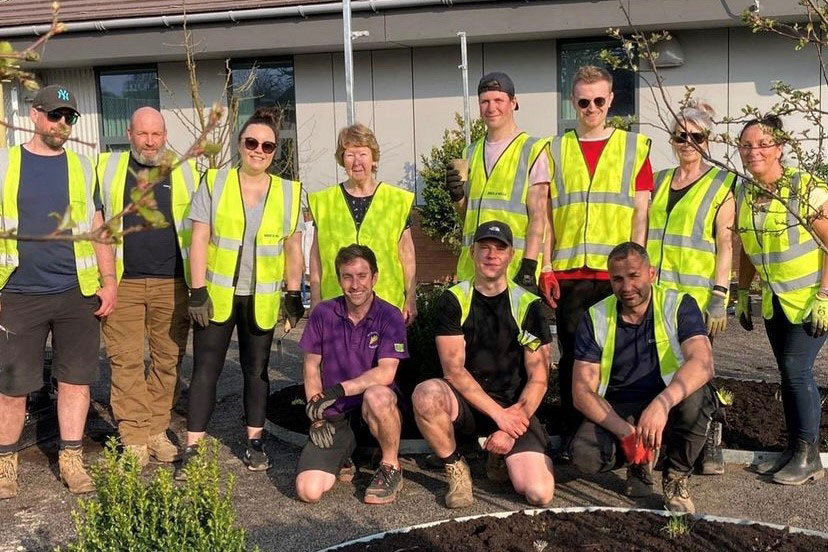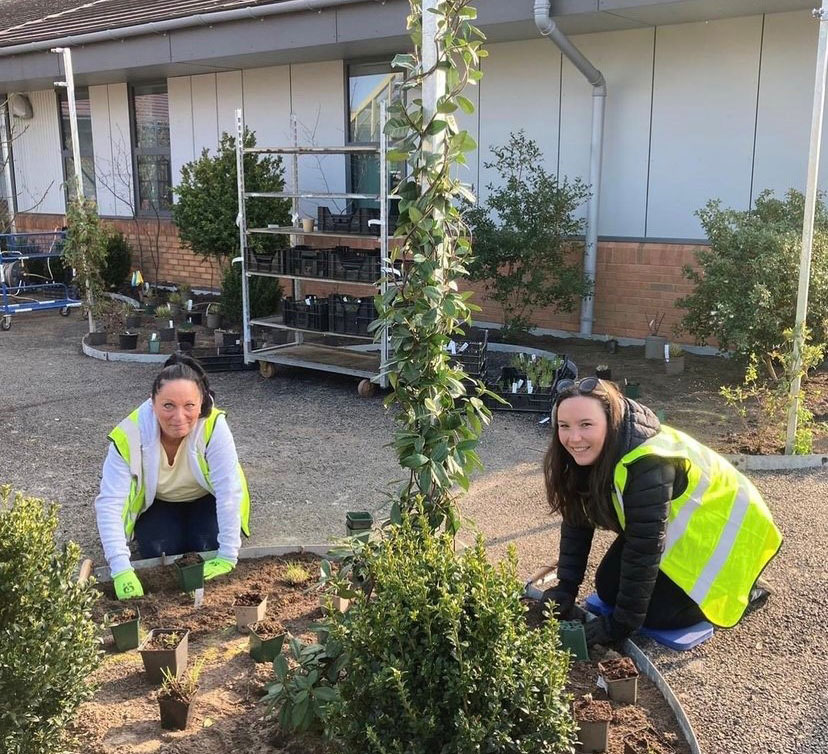As Volunteers’ Week 2023 comes to a close, Sandeep Gill, Senior Associate in our Serious Injuries Team, discusses how he and members of our Serious Injuries and Court of Protection teams regularly volunteer at Horatio’s Garden, Wales.
Volunteers’ Week is an annual celebration of the contribution millions of people make across the UK through volunteering in their communities. The UK Civil Society Almanac 2021 estimated, that 16.3 million people volunteered through a group, club or organisation in 2020/21. Volunteers’ Week takes place every year from 1-7 June. As this year’s Volunteers’ Week draws to a close, I wanted to share my thoughts on the many positives that I have experienced from my time volunteering at Horatio’s Garden.
What is Horatio’s Garden?
Horatio’s Garden nurtures the wellbeing of people after spinal injury in beautiful, vibrant sanctuaries within the heart of NHS spinal injury centres. Leading designers create the accessible, gardens where the charity’s team, alongside volunteers and creatives, care for people and plants alike.
The gardens are vital places for reflection and adjustment for people facing life-changing injuries and long stays in hospital. Impact studies demonstrate that everyone benefits – patients, their loved ones and the hospital staff too. The charity’s vision is to sustainably grow thriving communities and biodiverse gardens in all 11 NHS spinal injury centres in the UK.
The charity is named in memory of Horatio Chapple, who had the original idea to create a garden for patients with spinal injuries and their loved ones while volunteering at the Duke of Cornwall Spinal Treatment Centre in Salisbury during his school holidays.
In September 2012, the first Horatio’s Garden was opened at the Duke of Cornwall Spinal Treatment Centre in Salisbury. The garden was unsurprisingly a success and a nationwide charity was formed with the mission to create gardens in the ten outstanding UK spinal injury centres across the country. To date there are six Horatio’s gardens with the seventh garden under construction in Northern Ireland (opening later this year) and the eighth planned to open in Sheffield in 2024.
If you were watching, or were lucky enough to attend, the RHS Chelsea Flower Show this year you would have seen that Horatio’s Garden won the prestigious Best in Show award. The plan is for this award-winning garden to be incorporated into a Horatio’s Garden at the Princess Royal Spinal Injuries Centre in Sheffield. Although the charity’s garden in Sheffield will be eight times the size of the show garden at Chelsea Flower Show, as many of the original features as possible will make the journey up to Sheffield to take pride of place in the new garden there.
Hugh James and Horatio’s Garden, Wales
Hugh James are extremely proud of their regional partnership with Horatio’s Garden. We have supported Horatio’s Garden for the best part of five years in terms of fundraising and volunteering for it’s Cardiff-based garden. Members of the Serious Injuries and Court of Protection teams volunteer at the garden on a weekly basis, spending time in the garden but also speaking to the patients.

We have helped raise awareness of the garden and are part of the charity’s Wales fundraising committee, helping to raise thousands of pounds in the process.

Later this year, members of the Hugh James Serious Injuries team will be running the Cardiff Half Marathon in order to raise the funds required for Horatio’s Garden to continue to grow.
My connection to Horatio’s Garden
I have been volunteering at Horatio’s Garden for over a year now and have been fortunate to spend time there during all four seasons of the year. The garden has been beautifully designed by Sarah Price, who won yet another Gold Medal at the RHS Chelsea Flower Show his year. Head Gardner, Owen Griffiths has and continues to care for the garden which always looks it best, whatever the season.
During my time at the garden, I have learnt so much from Sarah, Owen and the other volunteers. But perhaps more so from the patients and families that use the garden. Hearing them talk in the garden with so much enthusiasm and joy, gives you a fresh perspective on life and all it’s worries. Watching a patient sat out in the garden taking in all the sights, smells, and sounds that it offers is evidence of how therapeutic the garden can be.
On my last visit earlier this year, I was able to support a patient, who I will refer to as M, during her occupational therapy session. We worked together in the green house, transferring seedlings into larger pots. The task was challenging for M and by the end she was tired. However, she clearly enjoyed every minute of it and was looking forward to returning to the green house the very next day for a further occupational therapy session. During our session together, she shared stories of growing up and spending time in the garden with her father. At no stage did she discuss her injuries, or the life changing consequences associated with them. I wonder if her outlook would have been as positive if she was having her therapy in the standard hospital setting? This is not to disparage the amazing work done up and down the country by occupational therapists on a daily basis, but rather the benefits the garden provides by offering an alternative setting and activity as part of a patients rehabilitation.
If I was asked what benefit I receive from volunteering and why I would encourage anyone reading this blog to do the same, I would say the following:
Giving back or supporting a cause you feel strongly about makes you feel all warm and fuzzy inside. Seeing how your time is benefitting others, how it makes their life a little easier or brings a smile to their face makes you feel good. You can see the real impact of your contribution.
The mental health benefits of time outside in the fresh air surrounded by nature and engaging in a physical activity (especially when the majority of my working day is spent at a desk) are also well known.
You also get to meet new, likeminded people who can inspire and motivate you to try things you would not have previously considered.
There are many more positives that I could list, but ultimately, the following quote from Winston Churchill succinctly offers a reason why:
“You make a living by what you get. You make a life by what you give.”
The Serious Injury Team at Hugh James specialises in supporting clients and their families who have suffered life changing injuries following road traffic collisions and accidents at work.
